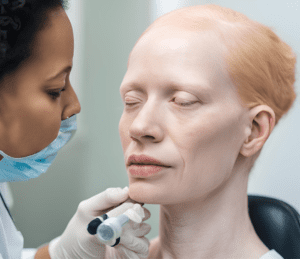Introduction
Understanding the health considerations of albinism is essential, as these factors can impact quality of life and overall well-being. Albino black people, in particular, face additional challenges due to their contrast between light skin and hair and typically darker features common in the black community.
In this article, we will explore seven critical health considerations that every albino black person should know. These health considerations range from the effects of UV exposure to managing vision problems and addressing the psychological impact of albinism. By understanding these risks, albino black individuals can take proactive steps to protect their health and improve their quality of life.
Can Albino People Go in the Sun? The Risks of UV Exposure for Albino Black People
Sun exposure is one of the most significant health concerns for albino people. Since individuals with albinism have little to no melanin in their skin, they lack the natural protection against harmful ultraviolet (UV) rays from the sun. Melanin helps protect the skin by absorbing and dispersing UV radiation, but for albino black individuals, the absence of this pigment means they are more susceptible to the harmful effects of sunlight.
For albino black people, the contrast between their lighter skin and darker facial features can make sun damage more noticeable. The risks of sunburn, premature aging, and skin cancer are significantly higher for albino individuals, so it’s crucial to adopt effective protective measures when exposed to the sun.
To minimize UV damage, albino black people should:
Use high-SPF sunscreen: It’s important to apply sunscreen with a high SPF rating (at least 50+) to prevent skin burns. Sunscreens that offer broad-spectrum protection against both UVA and UVB rays are ideal.
Wear protective clothing: Long-sleeve shirts, hats with wide brims, and sunglasses can help protect the skin and eyes from direct sun exposure.
Stay in the shade: When possible, seek shade to avoid prolonged sun exposure, especially during peak sunlight hours (10 a.m. to 4 p.m.).
Consider tinted eyewear: Albino black people are particularly sensitive to sunlight due to their light-colored eyes, so wearing sunglasses with UV protection is crucial for eye safety.
Without these protective measures, albino black individuals are at a much higher risk of developing skin issues such as burns and long-term conditions like skin cancer. These risks underscore the importance of sun safety in daily life.

Is Albinism Harmful to Health? Understanding the Long-term Effects
While albinism itself does not directly pose harm in the same way that some medical conditions might, the absence of melanin leads to a range of health risks that can affect both physical and mental well-being. For albino black people, these risks are compounded by the added challenges they face due to their unique appearance and the social stigma surrounding albinism.
The health concerns related to albinism primarily focus on the following areas:
Skin damage: The lack of melanin means albino black people are more susceptible to sunburns and other forms of skin damage, including the risk of developing skin cancer.
Vision problems: Albino black people often experience visual impairments such as reduced visual acuity, poor depth perception, and photophobia (light sensitivity). These vision problems are a direct result of the lack of melanin in the eyes.
Social challenges: The physical differences associated with albinism can lead to social isolation, discrimination, and stigmatization. These emotional challenges can take a toll on mental health, potentially leading to issues like anxiety and depression.
Despite these challenges, albinism itself is not life-threatening. However, the long-term effects on skin and vision require ongoing care, regular checkups, and psychological support to ensure that albino black individuals can live healthy, fulfilling lives.
How Long Do Albino Humans Live? Life Expectancy of Albino Black People
A common misconception is that people with albinism have a shortened life expectancy. However, albinism itself does not inherently reduce lifespan. The primary health risks associated with albinism, such as sun exposure and skin cancer, can affect quality of life and longevity, but they can be managed with proper care and vigilance.
For albino black individuals, the risk of skin cancer is significantly higher due to increased sun sensitivity. However, regular checkups with healthcare providers, especially dermatologists, can help detect early signs of skin cancer and allow for timely interventions. Monitoring skin health and seeking medical attention when necessary can prevent serious conditions and improve long-term health outcomes.
Furthermore, while vision problems are common in albino black people, these conditions, though challenging, are not life-threatening. Vision impairments can be managed with corrective lenses, therapies, and accommodations to help improve daily functioning.
Ultimately, the life expectancy of albino black individuals is similar to that of other individuals, provided that they take appropriate steps to manage their health and protect themselves from the environmental risks that come with albinism.
Why Do Albino People’s Eyes Shake? The Effects of Albinism on Vision
Vision problems are one of the most significant health concerns for albino black people. The lack of melanin in the eyes not only results in lighter-colored irises but also affects the functionality of the eyes. One of the most common visual conditions associated with albinism is nystagmus, which causes involuntary eye movement or shaking. This can lead to difficulties in focusing on objects, causing blurred vision and poor depth perception.
In addition to nystagmus, albino black people often experience:
Photophobia: Sensitivity to light is a common issue, making it difficult to be in brightly lit environments or outdoors without proper protection. The discomfort caused by light sensitivity can make daily tasks challenging.
Reduced visual acuity: Albino black people often have reduced visual clarity and may struggle with tasks such as reading or driving.
These visual challenges can be managed with corrective lenses, specialized eyewear, and certain visual aids designed to enhance clarity. For instance, using magnifying glasses, larger text, or screen readers can help improve visual accessibility in daily life.
It’s essential for albino black individuals to undergo regular eye exams to monitor these issues and seek appropriate treatments to alleviate discomfort and enhance vision. With the right interventions, many albino black people can lead active and independent lives.

Can Albino Black People Drive? The Impact of Vision on Mobility
For albino black individuals, vision problems caused by albinism can impact their ability to drive safely. Reduced visual acuity, poor depth perception, and light sensitivity can all make navigating the roads dangerous, particularly under certain lighting conditions or at night.
Some albino black individuals may still be able to drive with the help of corrective lenses or adaptive technology. However, it’s important to be aware of the risks and limitations associated with vision impairment. Many albino black people opt for other forms of transportation such as public transit or rideshare services to maintain safety.
If an albino black person is considering driving, it’s critical for them to have an eye exam with an ophthalmologist to assess their vision and determine whether it meets the requirements for driving. Additionally, they should take extra precautions when driving, such as wearing sunglasses to reduce light sensitivity and driving only during daylight hours when visibility is better.
Ultimately, mobility challenges related to albinism are manageable, but careful planning and proper accommodations are necessary to ensure safety on the road.
Social Stigma: The Psychological Health Considerations of Albino Black People
In addition to physical health challenges, albino black individuals often face significant psychological health risks due to social stigma and discrimination. The stark contrast between their lighter skin and hair and the typically darker skin tone in the black community can lead to social exclusion, teasing, or even bullying. These experiences can negatively affect mental health, causing feelings of isolation, anxiety, and depression.
Albino black people may also experience difficulties in self-acceptance, especially if they are constantly reminded of their differences by others. The social challenges they face can often be as significant as the physical challenges of albinism, and they require understanding and support from both family and community.
To address these psychological health concerns, it is important to:
Promote awareness: Educating the public about albinism and its impact on individuals can help reduce stigma and create a more supportive environment.
Provide emotional support: Offering access to counseling, support groups, and mental health resources can help albino black individuals cope with emotional challenges and improve self-esteem.
Encourage community inclusion: Fostering a sense of belonging and encouraging inclusive social settings can help reduce the emotional burden of albinism.
Psychological support is just as crucial as physical care when it comes to maintaining the overall health and well-being of albino black individuals.
Managing Skin Health: Protective Measures for Albino Black Individuals
Skin health is one of the top priorities for albino black people due to their heightened vulnerability to sun damage. As mentioned earlier, albino black individuals have a much greater risk of skin conditions such as sunburn, premature aging, and skin cancer. Without melanin to protect the skin, they need to take extra precautions to safeguard their skin’s health.
To manage skin health effectively, albino black people should:
Use sunscreen daily: High-SPF sunscreen should be applied every two hours when spending time outdoors. Sunscreens that are water-resistant and broad-spectrum offer the best protection.
Wear protective clothing: When outdoors, long-sleeve clothing, hats, and sunglasses can provide extra protection against harmful UV rays.
Monitor skin regularly: Regular self-examinations can help detect any unusual moles, freckles, or skin changes that may indicate early signs of skin cancer.
By adhering to these skin care guidelines, albino black individuals can help reduce the risks associated with sun exposure and maintain healthier skin over time.
Conclusion
Albinism is a genetic condition that presents several health challenges, especially for albino black individuals. From increased sun sensitivity to vision problems and the psychological impact of social stigma, the health considerations of albinism require careful management. By understanding and addressing these risks, albino black people can live healthier, safer lives. Regular checkups, proper skin care, vision correction, and psychological support are all essential aspects of managing albinism effectively.


